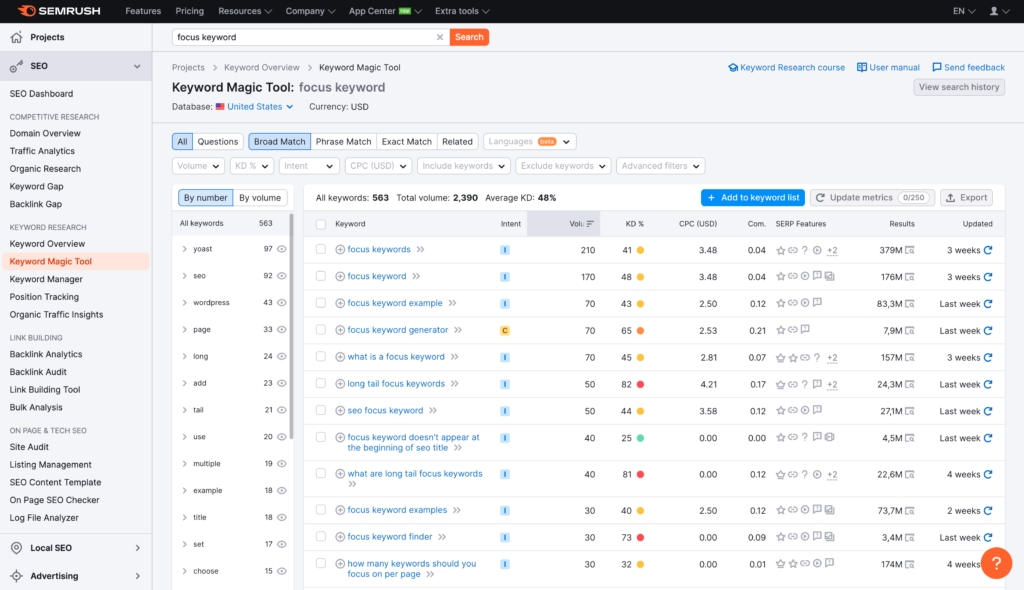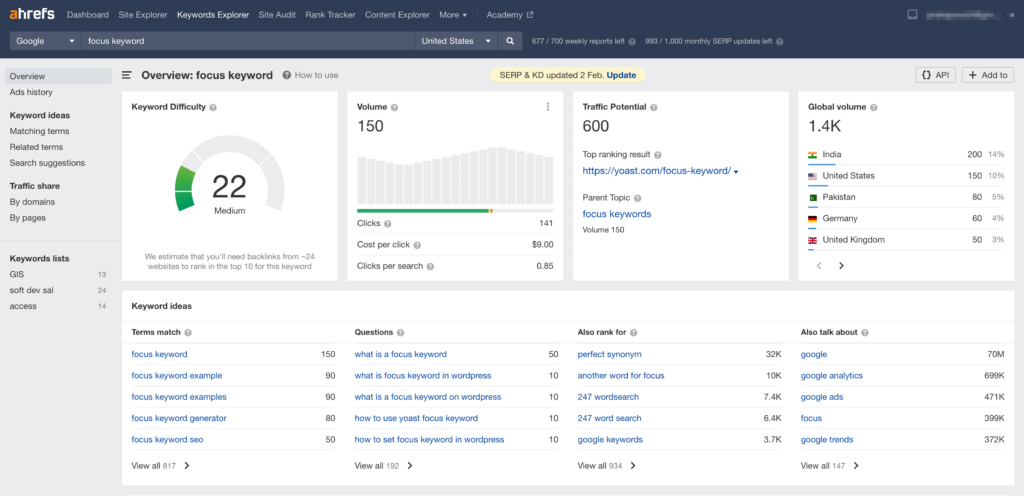
Are you struggling to get your website to rank high in search engine results? You might be missing a crucial piece of the puzzle: focus keywords. A focus keyword, also known as a focus keyphrase, is a specific term that you want your webpage to rank for in search engine results pages (SERPs). By using the right focus keyword on your webpage and optimizing your content around it, you can improve your SEO and increase organic traffic to your site.
But what exactly is a focus keyword, and how do you choose the right one for your content? In this article, we’ll answer these questions and more, helping you understand the importance of focus keywords in SEO and how to optimize your content for them. Let’s dive in and learn more about how focus keywords can help your website achieve better search engine rankings and drive more organic traffic.
What is a Focus Keyword?
When it comes to optimizing your content for search engines, the importance of keywords cannot be overemphasized as they play a vital role in this endeavor. But what is a focus keyword? A focus keyword, also known as a focus keyphrase, is the main keyword or keyword phrase that you want a particular piece of content to rank for on search engine result pages (SERPs).
By targeting a specific focus keyword for your content, you are signaling to search engines like Google that your content is relevant to users searching for that particular term. This can help improve your content’s visibility on SERPs and increase organic traffic to your website.
To put it simply, a focus keyword summarizes what your content is all about and helps search engines understand the topic of your page.
Topics vs Keywords vs Focus Keywords
Before we dive deeper into focus keywords, it’s important to understand the difference between topics, keywords, and focus keywords.
A topic is a general subject or theme that your content covers. For example, if you have a blog about fitness, your topics might include “cardio workouts,” “strength training,” and “healthy eating habits.”
Keywords, on the other hand, are specific words or phrases that users type into search engines to find information related to a particular topic. For example, if a user is looking for information on cardio workouts, they might type in “cardio exercises” or “best cardio workouts.”
Focus keywords, as we mentioned earlier, are the main keywords or phrases that you want a particular piece of content to rank for on SERPs. They are more specific than general topics and more targeted than keywords, making them an important part of any new website SEO strategy. For example, “best cardio exercises at home” or “best cardio workouts for beginners.”
A focus keyword can be a single word or a phrase, and it’s important to choose a keyword that accurately reflects the content on your page. When used correctly, focus keywords can have a significant impact on your SEO efforts and help you attract the right audience to your site.
How Focus Keywords Affect SEO
When you choose the right focus keyword for SEO, it can help improve your website’s visibility on SERPs for that particular term. However, it’s important to note that simply using a focus keyphrase in your content won’t guarantee a high ranking on SERPs.
In addition to using a focus keyphrase, you need to ensure that your content is high-quality, informative, and relevant to users’ search queries. This is where content optimization comes into play, and we’ll discuss it in more detail later in this article.
By optimizing your content around a specific keyword or phrase, you’re telling search engines exactly what your content is about and making it easier for them to crawl and index your site. This can help increase your visibility in search results and attract more organic traffic to your site. Learn more about keyword mapping for SEO.
What is a Good Focus Keyphrase?
A good focus keyphrase should accurately reflect the content on your page and be a term that people are actually searching for online. It should also be specific enough to help you target your ideal audience and broad enough to attract a significant amount of traffic to your site.
To choose the right focus keyphrase, you should conduct thorough keyword research and consider the following criteria:
- • Relevance: The focus keyword should accurately reflect the content of your page or post.
- • Search volume: The focus keyword should have a decent amount of monthly search traffic to make it worth targeting.
- • Competition: The focus keyword should have a reasonable level of competition, meaning it’s not too difficult to rank for.
By doing so, you can find the right balance between specificity and broad appeal and choose a focus keyphrase that will help you attract the right audience to your site.

How to Find and Choose Your Focus Keyword
Choosing the right focus keyword is crucial for any successful SEO strategy. Your focus keyword should be relevant to your website, easy to rank for and drive traffic to your website.
There are several ways to find and choose your focus keyword, including:
Brainstorm Your Keyphrase Ideas
Start by brainstorming keyphrases that are relevant to your website and the content you want to create. Consider your niche, your target audience, and the problems your content can solve. There are several tools available that can help you generate ideas for keyphrases, such as Google Trends, Google Autocomplete, and AnswerThePublic.
Focus on Long-Tail Keyword Targets
Long-tail keywords are highly specific search terms that usually consist of three or more words. While they may have a lower search volume, they are often less competitive and easier to rank for. Consider using long-tail keyphrases and keywords to increase the visibility of your website in search results.
Analyze Keyword Search Volume
To evaluate the potential success of your focus keyword, it’s important to research its search volume. Google’s Keyword Planner tool is a great resource for this task. By using the tool, you can see how many people are searching for your keyword each month and how much competition there is for it.
Evaluate Keyword Difficulty
Keyword difficulty refers to how easy or difficult it is to rank for a particular keyword. There are several tools available to help assess keyword difficulty, including Ahrefs, SEMrush, and Moz. By using these tools, you can analyze your chosen focus keyword and determine how competitive it is. This will help you decide whether to focus on a different keyword or adjust your content to better target the chosen keyword.
In these ways, you’ll be able to choose a focus keyword that can help you drive more traffic to your website and improve your search engine rankings.
How to Optimize Your Content for its Focus Keyphrase
This section will focus on how to effectively use your chosen focus keyword to optimize your content for better SEO performance.
Select a Distinctive Focus Keyword for Your Page
When optimizing your content for SEO , it’s important to choose one unique keyword or a key phrase that best represents the content on your page. This keyword should accurately reflect the main topic of your page, and ideally, it should be a long-tail keyword with relatively low competition. This can help search engines understand what your page is about and show it to the right audience.
However, not every page on your website needs to have a focus keyphrase, especially if the content is not intended to be discovered through search. In general, it’s a good idea to identify a focus keyphrase for pages that are meant to rank for specific search terms.
Create Engaging Content
Once you’ve chosen your focus keyword, it’s time to start writing your content. Good SEO blog writing also requires high-quality content that engages readers and builds authority in your industry. As you write, keep your focus keyword in mind and make sure to include it naturally throughout your content. However, be careful not to overuse your focus keyword, as this can be seen as keyword stuffing and can actually hurt your SEO performance.
Optimize Your Content for Maximum Impact
In addition to including your focus keyword in your content, there are several other areas where you can optimize your page to improve its SEO performance. This includes optimizing your page title, meta description, and header tags (H1, H2, etc.) to include your focus keyword.
Achieve the Perfect Balance in Keyword Optimization
When optimizing your content for a focus keyword, it’s important to find the right balance between using the keyword enough to signal to search engines what your content is about, and not overusing it to the point of keyword stuffing, because it’s a violation of Google’s spam policies and can lead to penalties and lower search rankings.
To avoid keyword stuffing, try to keep your focus keyword density at around 1-2% of your total content. Additionally, make sure to use related keywords and phrases (LSI keywords) throughout your content to help Google better understand the topic of your page.
It’s also a good idea to follow Google’s guidelines and best practices for SEO, which include avoiding black hat tactics such as hidden text, cloaking, and other manipulative techniques. You can learn more about Google’s guidelines for SEO in their webmaster guidelines.
So, while it’s important to include your focus keyword in key areas of your content, such as the title tag, meta description, and body text, make sure to also include variations of the keyword and use it in a way that feels natural and readable for human users.

By optimizing your content for your focus keyword while also following best practices for SEO, you can improve your chances of ranking higher in SERPs and driving more organic traffic to your website. If you need help with high-quality SEO content writing, feel free to contact our SEO agency for professional SEO writing services.
Best SEO Keyword Research Tools
When it comes to finding and choosing your focus keyword, there are a variety of tools that can help make the process easier and more efficient. Here are some of the best SEO keyword research tools available:
- • Ahrefs Keyword Explorer: This tool allows you to research keywords and get insights into their search volume, keyword difficulty, and more.
- • Ahrefs Keyword Generator: Another Ahrefs tool that helps you come up with new keyword ideas based on your seed keyword.
- • SEMrush: This is an all-in-one SEO tool that includes a keyword research feature. You can use it to find keywords, assess their difficulty, and track your rankings for them.
- • Keyword Surfer: This is a free Chrome focus keyword extension that provides you with search volume, CPC, and related keywords for any search query directly in Google search results.
- • MozBar: This is another Chrome extension that provides you with instant SEO metrics and insights, including keyword research.
- • AnswerThePublic: This is a tool that helps you generate content ideas by showing you questions and phrases people search for related to your keyword.
- • Keyword Tool: This is a partially free keyword research tool that uses Google Autocomplete to generate hundreds of relevant long-tail keywords for any topic.
These are just a few examples of the many SEO keyword research tools available. By using one or more of these tools, you can find and choose the best focus keywords for your website and content.
Final thoughts
Choosing the right focus keyword is essential for your SEO success. With the right focus keyword, your website can rank higher on search engines and attract more traffic. However, finding the perfect focus keyword can be a daunting task, especially if you don’t have the right tools and expertise.
To simplify the process of finding the best focus keyword for your website, you can use one of the many keyword research tools available online. Some of the best tools include Ahrefs Keyword Explorer, SEMrush, MozBar, and AnswerThePublic, among others.
At Mellow Promo, we understand the importance of choosing the right focus keywords for your website. Our team of SEO experts can help you find the best focus keywords that will improve your website’s search engine rankings and attract more traffic. We also offer a range of SEO content writing services to help you create high-quality content that is optimized for your chosen focus keyword.
With our expertise and cutting-edge tools, we can help you stay ahead of the competition and achieve your SEO goals. Contact us today to learn more about our services and how we can help you succeed in the online world.
Thank you for reading!
FAQ
How to pick a good focus keyphrase?
Choose a focus keyphrase that accurately describes the content of your page and matches the intent of the user’s search. Look for relevant and high-volume keywords with low competition.
Can you have more than one focus keyword?
Technically, you can have more than one focus keyword, but it’s not recommended. Focusing on too many keywords can dilute your content’s relevancy and impact. It’s best to focus on one primary keyword or keyphrase per page.
How to check a page’s focus keyword?
You can check a page’s focus keyword by examining the Meta Title tag, main Title (H1), and headings. For WordPress, you can use plugins like Yoast SEO or All in One SEO Pack to help you optimize your pages and ensure that your focus keyword is well-placed.
How specific should the keyword focus be?
The keyword focus should be as specific as possible while still accurately describing the content of your page. Specific keywords often have less competition and can attract more targeted traffic to your website.
Do I need a focus keyword for a service page?
Yes, you should have a focus keyword for every page on your website, with which you want to get into SERPs and get traffic, including service pages, but for the service page, it is important that the intent of the keyphrase is commercial. A well-chosen focus keyword will help search engines and users understand the content of your page and improve your chances of ranking higher in search results.
What should the focus keyword density be?
The ideal focus keyword density is a matter of debate among SEO experts, but generally, it’s recommended to keep it between 1-2%. Keyword stuffing, or using the focus keyword excessively, can result in penalties from search engines, so it’s important to focus on creating quality content that is relevant and useful to the reader rather than trying to optimize for a specific density.





